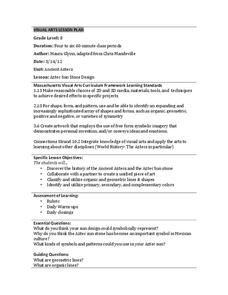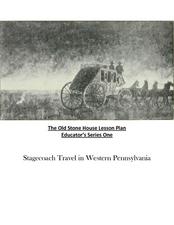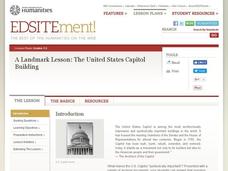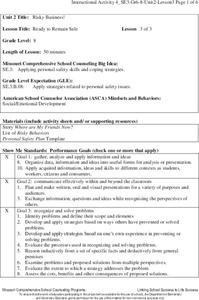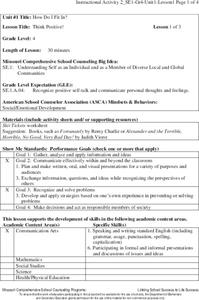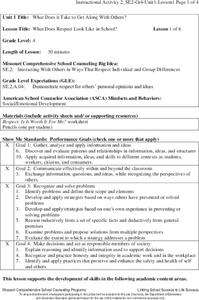Advocates for Human Rights
Mock Immigration Court
As part of a unit study of immigration, class members participate in a mock Immigration Court activity in which they argue four cases before an immigration judge.
Missouri Department of Elementary
R-E-S-P-E-C-T: A Basic Skill
Imagine seventh graders developing a school wide plan to promote respect in their school. That's the vision behind the second lesson in the R-E-S-P-E-C-T series. In preparation for designing a school-wide media campaign, class members...
National Endowment for the Humanities
Lesson 3: Britain, Napoleon, and the American Embargo, 1803–1808
While the French were once the allies of Americans, the Napoleonic Wars saw the United States almost drawn into a war with its one-time friend. Wars in Europe threatened to draw in the early republic. A primary source-based activity...
Center for History and New Media
The Impact of the Jim Crow Era on Education, 1877–1930s
Even though American slaves were officially emancipated in 1865, the effects of slavery perpetuated throughout the 19th and 20th centuries. Middle and high schoolers learn about the ways that discrimination and the Jim Crow laws...
Curated OER
The Monroe Doctrine: Whose Doctrine Was It?
Was James Monroe the sole contributor of the Monroe Doctrine? Young scholars study the doctrine and cite evidence to show contributions of John Quincy Adams and Thomas Jefferson in its formulation.
Curated OER
Ancient Aztecs
Is it a calendar? A religious symbol? A political statement? One thing for certain is that Aztec sun stone designs remain an important symbol in Mexican cultural art. Young artists craft their own Aztec Sun design incorporating ideas...
Curated OER
Executive Government: Executive Decision Making
Students make executive decisions. In this Social Studies lesson, students explore the concept of executive decisions through a game of chess. Students role play a year-level formal plan and implementation.
Curated OER
Old Stone House Lesson Plan
From stagecoach to railroad tracks, your class will discover how advancements in travel in the United States during the nineteenth century played an integral role in the industrialization and development of American society. The main...
Curated OER
A Landmark Lesson: The United States Capitol Building
Students study the events in American history that affected the US Capitol Building. They name activities that happen in and around the Capitol by looking at primary source documents that are available online.
School Improvement in Maryland
Analysis of Marbury v. Madison
Should the United States Supreme Court have the power of judicial review? Instructors guide class members through a review of Marbury v. Madison and assist class members in writing a brief of the case. As independent practice,...
Facing History and Ourselves
Understanding Identity
Key to social-emotional learning is understanding who we are. The first lesson in an Understanding Identity unit asks class members to consider the factors that shape one's concept of themselves, the parts of their identity they choose...
Curated OER
What They Left Behind: Early Multi-National Influences in the United States
Students examine how the European voyages of discovery influence American culture even today. They map eighteenth century Europe's impact on the United States.
PBS
Stereotypes vs. Statistics (Grades 4-8)
Stereotypes can be painful if they are used to discriminate against others. Statistics, however, can be helpful in dispelling myths propagated by stereotypes. Using a thoughtful lesson plan, scholars complete graphic organizers and...
National Constitution Center
Civil Liberties and Rights Worldwide
How do governments differ in how they protect human rights? While the United States prides itself on its Bill of Rights, other countries have their own ways of protecting citizens' liberties. An interactive website, paired with...
Advocates for Human Rights
The Rights of Women in the United States
Six diverse activities make up a substantial unit on the women's rights movement in the United States, past and present. A few of the topics at hand: the fourteenth and nineteenth amendments, the Equal Pay Act, the Lily Ledbetter Act,...
Missouri Department of Elementary
Putting on Armor
Peers can exert tremendous pressure that can lead to positive and negative consequences. To conclude the Risky Business unit, class members create a Personal Safety Plan. They list things or situations that cause stress, things they have...
Missouri Department of Elementary
Think Positive!
Following an attention-grabbing read-aloud, scholars brainstorm ways they can change negative thoughts into positive thoughts. Small groups plan and perform a skit that showcases one of the new ideas to uplift one's feelings....
Missouri Department of Elementary
Ingredients of a Relationship Recipe
An eye-catching hook makes a smart analogy between ingredients for a food recipe and ingredients for quality relationships. Scholars discuss and list qualities they feel contribute to positive interactions. Pupils create a recipe card...
Center for History and New Media
A Look at Virginians During Reconstruction, 1865-1877
The transition between rebellion to reunification was not smooth after the Civil War. Young historians compare primary and secondary source documents in a study of the Reconstruction era in Virginia, noting the rights that were not...
Missouri Department of Elementary
What Does Respect Look Like in School?
What does it mean to be respectful? Scholars complete a self-assessment worksheet to determine just how respectful they are. Next, they choose three items from the survey and write plans for how to improve in those areas.
Missouri Department of Elementary
How Does a Friend Act?
Two puppets showcase social skills while scholars decide whether their actions are positive or negative. Learners take turns with the puppets, acting out scenarios with a peer while the rest of the class decide if they're being a good...
PBS
The Media and the War: The Penny Press, Walt Whitman and the War
The Mexican-American war marked a significant moment in United States history, as well as in the history of American media. The mid-nineteenth century saw the introduction of the Penny Press, which provided many American citizens with...
Peace Corps
Culture is Like an Iceberg
What influences the way you dress, or celebrate holidays, or connect with your friends? Explore the cultural traits that are not easily seen with an engaging discussion. Using the model of an iceberg, learners place features of culture...
Curated OER
Planning a Community Event
Students work together to organize a fundraiser. For this community event lesson, students work collaboratively to plan and organize a fundraiser. Students create a timeline, venue and advertisements for the event.







